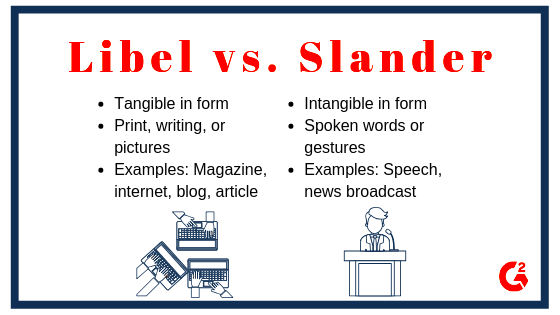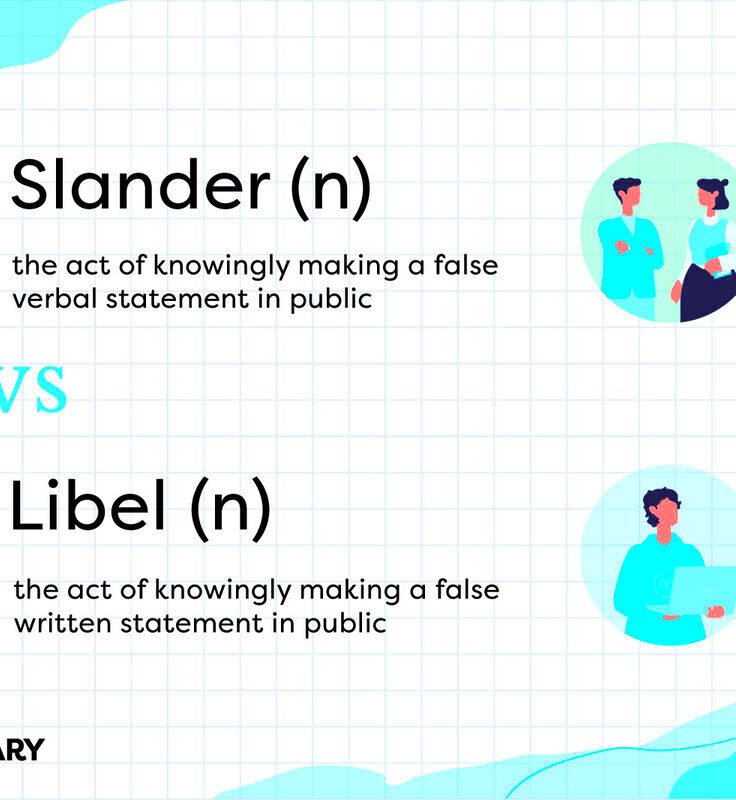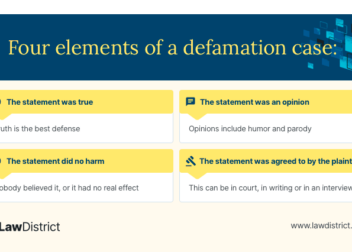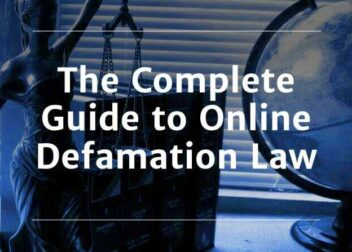Colorado’s Liability Laws for Slander and Libel
In Colorado, slander and libel fall under the broader category of defamation. Defamation occurs when someone makes a false statement that harms another person’s reputation. The key distinction lies in how these false statements are communicated. If you are dealing with a defamation case in Colorado, it’s important to know the differences between slander and libel and how the state’s laws apply to each.
Libel refers to defamatory statements made in writing or other permanent forms like online posts, newspapers, or broadcasts. Slander, on the other hand, involves spoken statements, typically in informal settings like conversations or public speeches.
Key Differences between Slander and Libel

Though slander and libel both constitute defamation, their differences mainly come down to the medium of communication. Understanding these differences can help when building a case or defending against accusations.
Key Differences:
- Libel: Written or broadcasted false statements that can be preserved as evidence. It tends to have a more lasting impact on reputation due to the permanency of the medium.
- Slander: Spoken false statements that usually occur in more temporary, verbal formats. Slander can be harder to prove since it’s not recorded or documented in most cases.
In Colorado, the law treats libel as more serious because written statements can spread faster and wider, causing more significant damage to the reputation. However, both forms can lead to legal claims if the statement is proven to be false and damaging.
Elements of a Defamation Claim in Colorado
To successfully file a defamation claim in Colorado, certain legal elements must be proven. These elements apply to both slander and libel cases. Understanding these elements is crucial when determining whether a statement is defamatory or protected under free speech.
Key Elements of Defamation:
- False Statement: The statement must be objectively false. True statements, even if harmful, are not considered defamation.
- Published to a Third Party: The false statement must be shared with someone other than the person it’s about. Simply making a false claim in private to the person concerned doesn’t count as defamation.
- Fault: The plaintiff must prove the defendant acted with negligence or actual malice, depending on the case. In some instances, it’s enough to show carelessness in verifying the facts.
- Harm: The statement must have caused actual harm to the person’s reputation, such as loss of business, emotional distress, or social standing.
In certain cases, Colorado law also considers whether the plaintiff is a public figure or private individual, which can change the burden of proof regarding fault and damages.
Defenses against Slander and Libel Accusations
If you’re facing slander or libel accusations in Colorado, it’s important to know that several legal defenses can protect you. Not all defamatory statements are punishable, and certain circumstances allow you to avoid liability. Here are some common defenses used in defamation cases.
Common Defenses:
- Truth: The most powerful defense in any defamation case is truth. If the statement made is proven to be true, it cannot be considered defamation, no matter how damaging it may be.
- Opinion: Defamation only applies to statements of fact, not opinions. If a statement is clearly subjective or framed as an opinion, it cannot be considered slander or libel.
- Privilege: Certain statements are protected under privilege. For example, statements made during judicial or legislative proceedings are typically immune from defamation claims.
- Consent: If the plaintiff consented to the publication or broadcasting of the statement, they cannot later claim defamation.
- Lack of Malice (for Public Figures): Public figures face a higher burden in defamation cases. If you can prove that you didn’t act with “actual malice,” meaning you didn’t knowingly spread false information, it could serve as a defense.
These defenses are vital in navigating a slander or libel case. Each one requires careful legal analysis and sometimes concrete evidence to be effective in court.
How Damages Are Calculated in Defamation Cases
In Colorado, damages in defamation cases aim to compensate the victim for the harm caused to their reputation, emotional well-being, and sometimes even their livelihood. The court calculates damages based on several factors, which can vary depending on whether the defamation involved slander or libel.
Types of Damages in Defamation:
- Actual Damages: These are intended to compensate for the direct harm suffered by the victim. They can include financial losses like lost wages or business opportunities, as well as non-economic harm like emotional distress.
- Presumed Damages: In some cases, especially involving libel, the court may assume harm has occurred even without specific proof. This typically happens when the defamatory statement is so damaging that it’s presumed to have caused harm.
- Punitive Damages: These are awarded when the defendant’s actions are found to be particularly malicious. Punitive damages are meant to punish the wrongdoer and deter others from similar behavior.
Factors Influencing Damages:
- The extent of harm caused to the plaintiff’s reputation.
- The public or private nature of the defamatory statement.
- Whether the plaintiff is a public figure or private individual.
- The level of intent or negligence exhibited by the defendant.
Colorado courts carefully weigh these factors before determining the total amount of compensation the victim should receive in defamation cases.
Statute of Limitations for Defamation in Colorado
In Colorado, like most states, defamation claims are subject to a statute of limitations. This means there’s a limited time window within which a plaintiff can file a lawsuit for slander or libel. Missing this deadline could result in the case being dismissed, even if the defamation is proven.
Colorado’s Time Limits:
- One Year Limit: In Colorado, the statute of limitations for defamation claims, whether slander or libel, is one year from the date the defamatory statement was made or published.
- Discovery Rule Exception: In some cases, the “discovery rule” might apply. This means the one-year period begins when the plaintiff discovers, or reasonably should have discovered, the defamatory statement, rather than when it was originally made.
Why the Statute of Limitations Matters:
- Encourages timely resolution of disputes and avoids stale evidence.
- Ensures witnesses’ memories are fresh and relevant information is available.
- Protects defendants from indefinite legal exposure for past statements.
If you believe you have been defamed, it’s essential to act quickly to ensure your case is filed within Colorado’s statute of limitations.
Legal Remedies for Victims of Defamation
If you’ve been a victim of slander or libel in Colorado, the law offers several legal remedies to help restore your reputation and compensate you for any harm done. Defamation cases can be complex, but the courts provide clear pathways for addressing the damage caused by false statements.
Common Legal Remedies:
- Monetary Compensation: Victims can receive compensation for both financial losses (such as lost wages or business) and non-economic damages (such as emotional distress or harm to reputation).
- Injunctions: A court may issue an injunction, which is an order to stop the defendant from continuing to make defamatory statements. This can prevent further harm to your reputation.
- Retractions: In some cases, the court might require the defendant to issue a public retraction or apology to mitigate the damage caused by their false statement.
- Punitive Damages: If the defamation was particularly malicious, punitive damages may be awarded to punish the wrongdoer and discourage similar conduct from others.
These remedies are designed to balance the harm done to the victim and discourage harmful speech without infringing on free speech rights. Every case is unique, and the appropriate remedy depends on the circumstances and the severity of the defamation.
Frequently Asked Questions about Slander and Libel in Colorado
1. What’s the difference between slander and libel in Colorado?
Slander refers to spoken defamatory statements, while libel refers to written or published defamatory content. Both fall under defamation laws but differ in how the statements are communicated.
2. How do I prove a defamation claim?
To prove defamation, you need to show that a false statement was made, it was published to a third party, it caused harm to your reputation, and the defendant acted negligently or maliciously.
3. Can I sue for defamation if the statement was just an opinion?
No, defamation laws in Colorado only apply to statements of fact, not opinions. However, if an opinion implies a false fact, it could still lead to a defamation claim.
4. What’s the time limit for filing a defamation lawsuit?
In Colorado, you have one year from the date of the defamatory statement to file a lawsuit. Missing this deadline can result in your case being dismissed.
5. Can public figures sue for defamation?
Yes, but public figures must prove that the defamatory statement was made with “actual malice,” meaning the defendant knew it was false or acted with reckless disregard for the truth.
Conclusion on Colorado’s Defamation Laws
Colorado’s defamation laws provide a clear framework for addressing slander and libel cases, balancing the protection of individual reputations with free speech rights. Whether you’re a victim of false statements or accused of defamation, understanding the legal nuances of these cases is crucial.
While slander typically involves spoken words and libel covers written or published content, both forms of defamation can result in serious harm. Colorado courts offer various remedies, including compensation, injunctions, and even punitive damages for particularly malicious cases. However, strict elements must be met to win a defamation claim, and time limits apply. If you are dealing with defamation issues, consulting with an attorney early in the process can help ensure your rights are fully protected.


